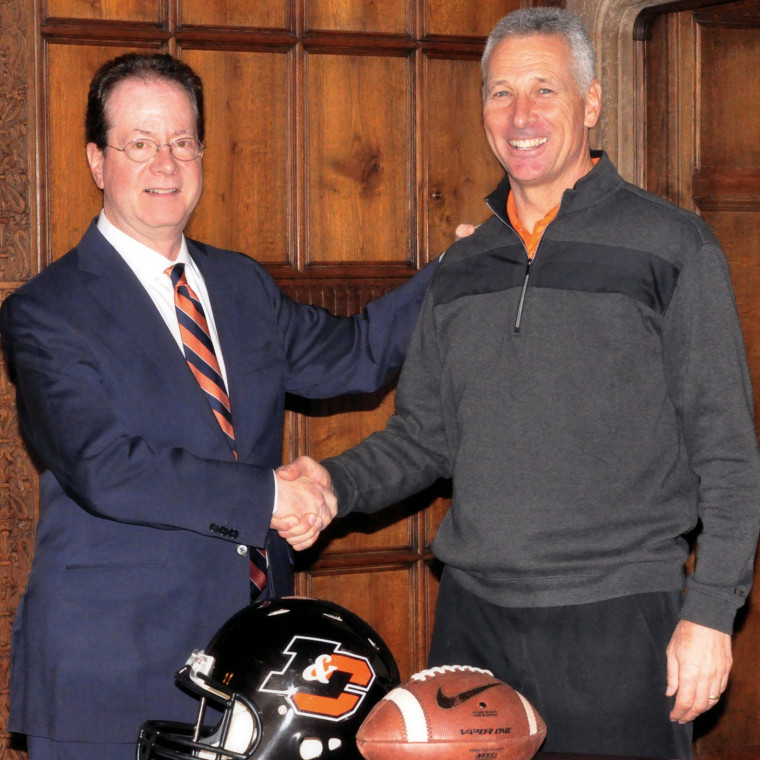Meet the New Football Coach
Open gallery

In December, Jay Locey was named the 10th head coach in Lewis & Clark football history. He most recently served as the chief of staff for Oregon State University’s football program in Corvallis. Prior to joining OSU, Locey spent 10 seasons as the head coach of the Linfield Wildcats, a team he led to the 2004 NCAA Division III National Championship. He ended his career at Linfield with an 84-18 overall record, guiding the Wildcats to 41 consecutive wins and six Division III play-offs.
Why return to the Northwest Conference and NCAA Division III?
I learned a lot of great things while at Oregon State as an assistant coach and as the chief of staff, but I am looking forward to being a head coach again. The other thing that interested me was that it’s close to home. I am an Oregonian… that’s just who I am.
What are some of Lewis & Clark’s strengths?
There is strong administrative support— Lewis & Clark wants to invest in this program and make it successful, and that excites me. In terms of recruiting, the academic component speaks for itself. Anyone who comes here is privileged to leave with a great education. The Portland location is outstanding, and the campus and football stadium are absolutely incredible.
What challenges does the football program face?
Right now, we need to find our identity, our niche. We need to build on who Lewis & Clark is and get the word out. Currently our player numbers are low, so we need to get coaches on the road recruiting. We want to recruit hard in Oregon, as well as in our region [California, Washington, Arizona, Colorado, Idaho, Hawaii] and in other places where we’ve had success. Over time, we also want to branch out nationally.
What are your goals for the program?
I’m not going to throw out a win or loss record, but we are going to redefine what it means to win. Early on, it’s about building a culture as much as anything. Good coaches—people like John Wooden, Pete Carroll, and Nick Saban—define winning as having the peace of mind of being the best you can possibly be. That means making the most of every day, every drill. In every aspect of your life, be your best. We want our players to have a commitment to excellence and to leave a mark of class every day—whether it’s in the dorms, in the classroom, in the weight room, or on the football field. When you have a commitment to excellence, everything else takes care of itself, especially the winning.
How do alumni fit in?
I hope alumni take a very supportive role because it’s going to take their help to build this program back up. We want them to become friends of the program and help us build that culture of excellence. One of the best recruiting tools is when your alumni let you know about a young player they’ve seen who would be a great fit. They are also instrumental in talking up the program and what we’re building here to help generate interest. Financial support is always helpful, but that’s part of our job to reach out to alumni and get them involved and engaged. I would love to get alumni involved in networking events, where they can mentor our players in the transition from college athletics to the real world. I did some of that at Oregon State and found it was a great way to engage both players and alumni.
How does Division III athletics complement the overall liberal arts experience?
The beautiful thing about athletics is it provides the opportunity to learn the intangibles of success. If you think of athletics as a classroom, it actually instills some of the most common traits of success: hard work, teamwork, overcoming obstacles, picking yourself up off the floor, and conflict management. In athletics, you compete in front of people and you learn how to handle yourself because of it. So I think it creates a great opportunity for people to grow in grit, which is often the No. 1 ingredient of success.
In your view, what is the most important take-away for Pioneer football players?
Someone once asked Amos Alonzo Stagg, a pioneering American football coach, “How good is your football team going to be?” His answer was perfect: “I won’t know that for another 20 years.” What we’re trying to do, that gives us great satisfaction as coaches, is teach these student-athletes principles and concepts that they can apply on and off the field. We want them to have experiences in football that can make them successful in life—as family members, as employees or employers, and as community members.
—Compiled by Kristian Martin, Sports Information Director
More L&C Magazine Stories
Lewis & Clark Magazine is located in McAfee on the Undergraduate Campus.
MSC: 19
email magazine@lclark.edu
voice 503-768-7970
fax 503-768-7969
The L&C Magazine staff welcomes letters and emails from readers about topics covered in the magazine. Correspondence must include your name and location and may be edited.
Lewis & Clark Magazine
Lewis & Clark
615 S. Palatine Hill Road MSC 19
Portland OR 97219

